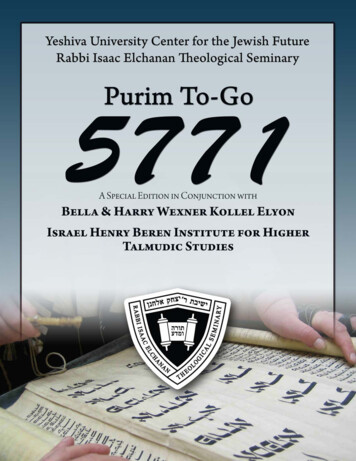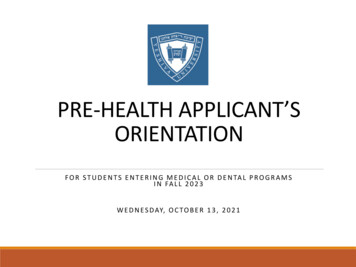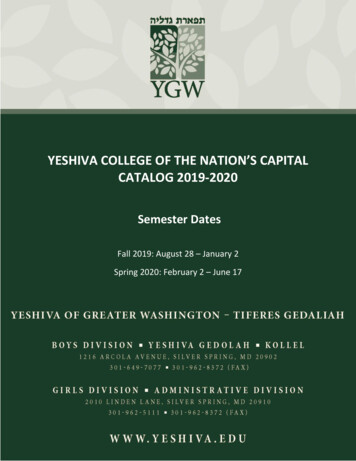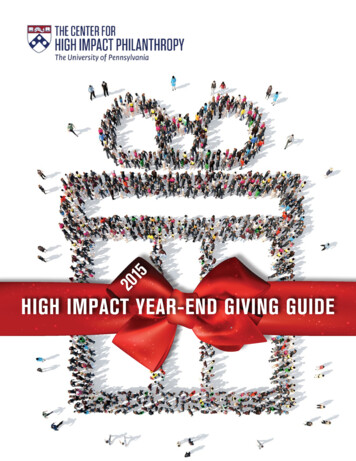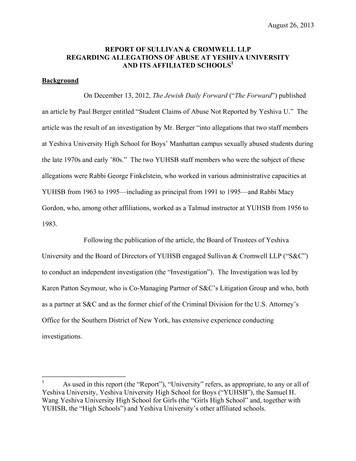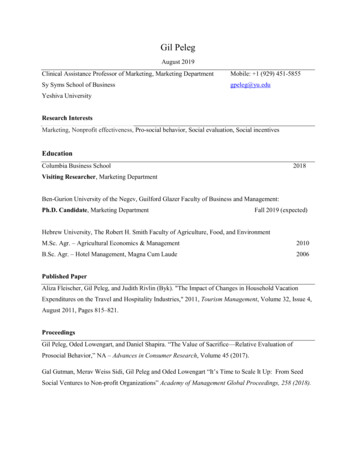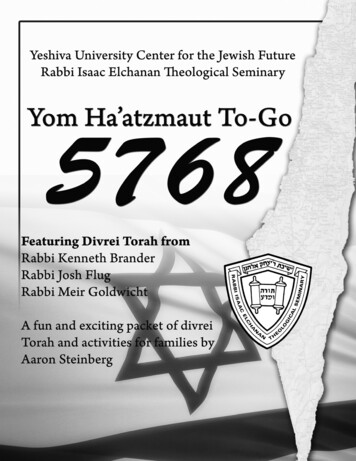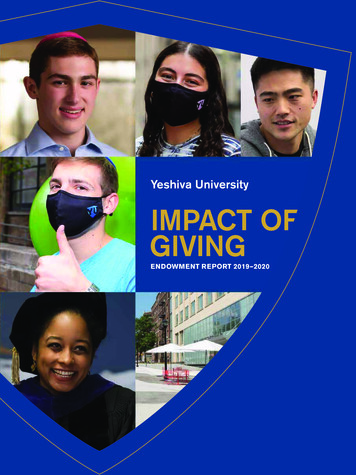
Transcription
Yeshiva UniversityIMPACT OFGIVINGENDOWMENT REPORT 2019–2020
BUILDING TOMORROW,TODAY
INSPIRATIONAND INNOVATIONThis has certainly been a year of challengesbut also one of remarkable innovation andinspiration. Throughout it all, I have been soproud of Yeshiva University.We have responded with care and compassion. We have tapped the best of our resources—ourstudents and faculty, our roshei yeshiva and community—to navigate emerging situations and offercreative solutions.Our greatest challenge was—and continues to be—ensuring that all our students can continue earningtheir degrees safely despite any financial obstacles brought on by COVID-19. To move toward thisgoal, we created the Emergency Scholarship Campaign. Thanks to our generous community, weraised over 4.4 million from 1,400 donors in two months, raising critical scholarships for students inneed. Through the partnership of our committed donors, we continue to pursue achievement in everyarea of YU while ensuring the health and safety of our students.As always, we lead with our values. The world demands the kind of leadership our University and ourgraduates can provide. With deep gratitude to donors like you, we can continue our critical mission ofeducating the next generation of leaders who will tackle the problems of today and tomorrow.We truly value your partnership in creating excellent opportunities for our students. The world relieson them and they rely on us.Thank you.With gratitude,ADAM Z. GERDTSVice President for Institutional AdvancementTEST OF TIMEThink you know YU history?Take our quiz on the followingpages to assess yourknowledge. You’ll find theanswer key on page 35.23
89%DEALING WITH COVID HAS5%increase in alumni givingPUSHED US TO GROW IN SOMANY WAYS. IT HAS PRESENTEDENORMOUS CHALLENGESBUT ALSO OPENED UP NEWOF THE DAY BUT ALSO SETTINGAlumni in the YU family5of YU undergraduate studentsreceive scholarshipsNew professional development certificate programsto prepare students for a changing economy:21OURSELVES UP FOR SUCCESSPlacesIN THE WORLD OF TOMORROW.YU rises 21 places to #76in the U.S. News & World ReportBest Colleges Rankingsfrom the previous yearDR. ARI BERMANPresident of Yeshiva University70,000 80%POSSIBILITIES. WE ARE NOTONLY ADDRESSING THE NEEDSincrease in the number of grants awarded for faculty(a 114% increase in dollars awarded)27CountriesUndergraduates come fromtwenty-seven countries inaddition to the United StatesInstructional Design Tele-Mental HealthDigital Education Administration Serious Game DesignHow to Start a Business94.3%of the undergraduate Class of 2019 had postgraduationdestinations within six months of graduating 51.7Millionphilanthropic support of YU in fiscal year 202053Benjamin N. Cardozo School of Law ranked #53 in the U.S. News & World Reportlaw school rankings a 22-place jump in four years45
RYAN TURELLFULL-COURTPRESSHISTORY WAS MADE FOR YU’S MACCABEESas second-year guard Ryan Turell became thefirst sophomore in school history to reach the1,000-career point plateau. The Los Angeles nativeis also the fastest player in the 89-year historyof the men’s basketball program to achieve themilestone.But more than being the consummate player,Turell is the consummate team player.“ YOU CAN COME TO YU, PLAYBALL AT A VERY HIGH LEVEL,KEEP YOUR JUDAISM AND WINCHAMPIONSHIPS. IT’S THEBEST OF BOTH WORLDS.”“His selflessness on the court and ability to make histeammates better is just awesome,” says YU HeadCoach Elliot Steinmetz ’02SB, who himself waschosen D3hoops.com National Coach of the Year in2020. “The fact that he can score the way he doesis just a bonus to his overall game.”QUESTION 1Who was the last YU player takenin the NBA draft?A. Irv Bader (Baltimore Bullets, 1960)Last season was historical for the team, which wonthe 2019–20 Skyline Conference Championshipand made it all the way to the Sweet 16 ofthe NCAA Tournament before the rest of thepostseason was canceled. Turell was named Playerof the Year by both the Skyline Conference and theMetropolitan Basketball Writers Association andchosen as one of the top five players in the country.A marketing major at Sy Syms School of Business,the 6-foot-7-inch point guard turned down opportunities to attend West Point and other schools to playhoops for the Macs. He’s never looked back.“When it came to a college decision, I thought aboutthe way I was raised,” explains Turell, who says aleadership scholarship helped make attendancepossible. “I realized how important Shabbat andJewish observance are to me. I wouldn’t be able toremain religious if I went to any of the other schools.”Another reason he hasn’t looked back: teamchemistry. According to Turell, the Macs are as tightduring the offseason as they are on the court.“A big reason why we’ve won so many games isbecause no one is going for individual accolades,”he says. “Our motto is ‘Chasing letters, notnumbers.’ ”When he gets his diploma in 2022, Turell hopes toplay professional basketball in Israel. “When the ballstops bouncing there, I’d like to return to the Statesand get into real estate.”In the meantime, he’s scoring for YU and hoping topass a message on to other Jewish students whowant to be part of a serious team at school. “Youcan come to YU, play ball at a very high level, keepyour Judaism and win championships. It’s the bestof both worlds.”B. Sheldon Rokach (Philadelphia 76ers,1966)C. Harvey Scheff (Washington Wizards,1982)D. Dave Kufeld (Portland Trail Blazers, 1980)E. Joel Jacobson (Miami Heat,1997)67
ALEXANDER TSIGUTKINAMERICANDREAMERIN FEBRUARY 1980, ALEXANDER TSIGUTKINimmigrated to New York from the Ukraine, ready topursue his dreams of getting a degree in computerscience. Yeshiva University piqued his interest,but while he was armed with plenty of drive anddirection, fluency in English and Hebrew wasn’t partof his arsenal.The then-director of YU’s James Striar School ofGeneral Jewish Studies, designed for students withless familiarity with Hebrew language and textualstudy, saw promise—and took a chance.“ GIVING BACK CREATES A BONDBETWEEN THE PAST, PRESENTAND FUTURE.”“He told me that if I learned how to read and writeHebrew by June, I could enroll,” recalls Tsigutkin,who began to study alongside young children inBrooklyn. Drive and direction prevailed. By 1983,he had earned his bachelor’s in computer science.QUESTION 2Who proclaimed “YeshivaUniversity’s Centennial Yearin New York City” and wasawarded a Centennial Medallionin November 1986?A. New York City Mayor Edward I. KochB. New York Governor Mario CuomoC. Yeshiva University President Dr. Norman LammD. Anchorman Tom BrokawToday, Tsigutkin is the Founder and Chief ExecutiveOfficer of Axiom Software Laboratories, a WallStreet-based firm dealing in regulatory reporting,data management and risk-management solutionsfor the financial services industry. Launched in1991, the company now has more than 1,000employees and operates in 20 countries. Its clientbase spans regional and global financial institutionswith more than 43 trillion in total assets andinvestment managers with more than 11 trillion inassets under management.says Tsigutkin, whose family was the first from hisUkrainian city of Mariupol to flee Soviet oppressionseeking a better life.With the help of scholarships and loans, YUprovided him not only with an education thatpropelled him to realize his American dream butalso with an appreciation for how “Yiddishkeitand secular studies complement one another.I had no Jewish background. YU gave me afoundation that I have been able to pass downto my three children.”Tsigutkin sees the same drive and direction thatmotivated him in the YU graduates he hires atAxiomSL. “They are great assets to our firm,”he says.Helping students is just one way that Tsigutkin paysit forward. His philanthropic gifts to YU providethe next generation of promising students with achance not only to dream big but also be preparedto make it happen.“YU is where I learned how to be a better person,where I learned professional skills in computerscience and entrepreneurship, and where I gaineda foundation for my Yiddishkeit,” he explains.“Giving back creates a bond between the past,present and future.”“We came from the Soviet Union with nothing.There is no way I could have afforded college,”E. Israeli Prime Minister Yitzhak Shamir89
VIVA WHITECREATINGCHANGE IN THECOMMUNITYA LOT CHANGES IN 17 YEARS. CAREERSadvance. Technology develops. The world aroundus transforms, sometimes in mysterious ways.For Viva White, one thing has not changed: herpassion for social work and social change.Seventeen years after receiving her Master ofSocial Work from the Wurzweiler School of SocialWork, White—who boasts a literal alphabet ofprofessional credentials, including LCSW, LCADC,CCS, MAC, MSW, ACS—is back at Wurzweilerpursuing her Ph.D.“ DONORS LEAVE A LEGACYBECAUSE THEIR ALTRUISMHAS A MULTIGENERATIONALIMPACT. THEY ARE THEUNSEEN HEROES.”QUESTION 3Who has NOT spoken at YU?A. Sir Paul McCartneyB. Barbra Streisand, SingerC. Archbishop Desmond TutuD. Former President George H.W. BushE. Former President Mikhail S. Gorbachevof the USSR18A native of Paterson, New Jersey, White says thatduring an open house at Wurzweiler, she was“mesmerized by the warmth of the faculty and all ofthe programs the school offered.”A Dorothy and David I. Schachne Scholarship madeattendance possible. “I most likely wouldn’t havebeen able to enroll if not for that scholarship,” shesays. “Education is power, and my master’s degreeopened a lot of opportunities.”White seized these opportunities with both hands.In addition to pursuing her doctorate, she servesas an adjunct professor at Wurzweiler, maintainsa private practice and, in 2012, founded Balm inGilead Community Services, Inc. The Newark,New Jersey-based nonprofit provides behavioralhealth services for communities facing crime,poverty and violence.Her work with the community is moreencompassing—and arguably more important—than ever. Her research interest is in the area ofeducation in poverty-stricken communities.She has co-hosted a series of Facebook Liveevents on Black women’s empowerment withSB Empowerment and Consulting Servicesand recently facilitated a workshop for RutgersUniversity School of Social Work on The Impact ofWhite Dominant Culture on Social Work Practice.She conducted a series of workshops on Blackwellness and the mind/body connection with theNew Jersey chapters of the National Associationof Black Social Workers as well as a threehour anti-racism workshop for more than 300participants. Working with myriad partners, she hasled workshops on mental health, trauma, violenceand self-care. And this was just a sampling of herinitiatives over the summer.Recognizing the trajectory her initial Wurzweilerscholarship set in motion, White now donates toscholarships each year in the hope of setting futurestudents on the paths to their dreams.“The Schachnes helped me and now I can supportthe education of my three children and otherstudents,” White states. “Donors leave a legacybecause their altruism has a multigenerationalimpact. They are the unseen heroes.”11
JECHIEL VAN DIJKQUANTUMLEAPQUANTUM COMPUTERS PERFORMcalculations based on the probability of an object’sstate before it is measured—instead of just 1s or0s—which means they have the potential to processsignificantly more data than classical computers.This cutting-edge technology based on quantumtheory will lead to discoveries in medicine, materialsand fuel.The possibilities are exponential.Just ask Jechiel Van Dijk ’20YC, a recent graduateof Yeshiva College who is continuing on at theKatz School of Science and Health for his master’sdegree in physics. The recipient of the AbrahamParkoff Endowed Scholarship, the Amsterdamborn-and-bred Van Dijk was educated in theNetherlands, the United Kingdom and Israel beforelanding on an algorithm for his next steps.“I had three specific criteria. I needed to haveinstruction in English or Dutch, I wanted to learn ina Jewish environment and I wanted an excellentprogram in math or physics,” he recalls. “I had atough time finding a program that fit all of thoserequirements. Then I discovered Yeshiva University.”Without a scholarship, Van Dijk says enrolling atYU would have been impossible. “My scholarshipgave me the opportunity to attend YU and takeadvantage of the learning and experiences here. Itgave me the future I am going to have,” he explains.During the summer of 2019, Van Dijk workedin the lab of Dr. Tomer Lewi of the AlexanderKofkin Faculty of Engineering and Institute ofNanotechnology and Advanced Materials atBar-Ilan University, whose research interestsinclude nanophotonics, light-matter interactionsand metamaterials. Experiences like these helpedVan Dijk home in on a career direction.His career choice came down to answers to whatVan Dijk calls the “big questions”: What am I goodat? What am I most interested in? What field willallow me to support myself?And what may be most important: What does theworld need?“Quantum computers have the potential to changethe world in a dramatic way,” he says. “I want to bepart of that.”“ MY SCHOLARSHIP GAVE MEQUESTION 4What is NOT a high-tech graduateprogram at YU?YU AND TAKE ADVANTAGEA. Biotechnology Management and EntrepreneurshipOF THE LEARNING ANDB. Data and Privacy LawC. Technology PolicyD. Data Analytics and VisualizationE. Digital Marketing and Media12THE OPPORTUNITY TO ATTENDEXPERIENCES HERE. IT GAVEME THE FUTURE I AM GOINGTO HAVE.”13
LILY POLONETSKYSUMMERREBOOTBACK IN EIGHTH GRADE, A PUCKISH PRETEENspammed Lily Polonetsky’s inbox with hundredsof emails. When she marched up to him demandingthat he stop, he told her it was no problemand showed her the quick script he had coded.Polonetsky’s interest in computer science—if notin the mischievous middle schooler—was piqued.“My interest grew in high school,” says Polonetsky,a native of Teaneck, New Jersey. At Ma’ayanotYeshiva High School for Girls, she studiedcomputer programming and, in her final year,AP computer science.While considering colleges, Polonetsky sat in ona class taught by Prof. Alan Broder, chair of thecomputer science department at Stern College forWomen, and she was hooked.QUESTION 5What monarch was honored by YUand Benjamin N. Cardozo Schoolof Law in April 1997?A. King Juan Carlos I of SpainB. Queen Elizabeth II of the United KingdomC. Queen Margrethe II of DenmarkD. King Mohammed VI of MoroccoE. King Willem-Alexander of the Netherlands14“I was really impressed with how dedicated he was,”she remembers. Recognizing that Polonetsky was aprospective student, the girls in the class confirmedthis—and more. Then she spoke with graduates ofthe program. “The quality of the people andthe camaraderie among the computer sciencestudents stood out to me.” Polonetsky was alsoimpressed with the career trajectories of alumnaeand the way they spoke about being part of theStern community.A recipient of both the Professor Thomas OtwayMemorial Scholarship and an Honors scholarship,Polonetsky, now a junior, served as the leadstudent for the computer science department’ssummer initiative: an open-source project to writecode for algorithm visualizations. Mentored byStern College faculty and industry professionals,the internship program was created to provideexperiences to replace those that evaporatedwhen COVID-19 hit.“Our code is all on Github [an open-source versioncontrol system] for all to see and benefit from.Future students studying data structures in Stern,other universities and on the web will have openaccess to view and add to the project,” she explains.“I learned about the process of code standardizationthroughout a project, how to review other people’scode and how to work on code as a team.”That’s just one of many opportunities Polonetskyhas found at Stern College. Last year, she workedwith Dr. Joshua Waxman on his research, “Analyzingthe Language and Discourse of the BabylonianTalmud,” which was presented at the 2020Israel Seminar on Computational Linguistics inSeptember. She also currently serves as a teachingassistant for Prof. Broder’s Linux Programming forData Analysis this fall.“ THE QUALITY OF THE PEOPLEAND THE CAMARADERIEAMONG THE COMPUTERSCIENCE STUDENTS STOODOUT TO ME.”Polonetsky is now considering next steps again.She is contemplating continuing on for a master’sdegree. Or perhaps working for a big tech company,such as Google or Facebook. Then again, she isalso interested in finance.“Maybe I’ll pursue something in the financial techfield. But who knows? Maybe I’ll go for a Ph.D.,” shesays. “There are a lot of things I’m excited about. Ijust love everything about computer science.”15
ETHEL GRUENA LEGACYTHAT LASTSit, their research suggested that Yeshiva Universitywould be the best fit.“Ronnie called and spoke to Dr. Herbert Dobrinsky[Vice President for University Affairs], askinghim if Yeshiva University would accept such anendowment and take on the responsibility ofdistributing yearly grants to qualifying schools,”she remembers. After ironing out details, theendowment was established.Ethel and Ronald Gruen z”lDEEPLY ENGAGED IN JEWISH EDUCATIONas both leaders and philanthropists, Ethel andRonald Gruen z”l of Dallas, Texas, identified a crisisjeopardizing their efforts: By high school, manystudents abandon much of what was invested intheir Jewish education, convinced it is irrelevant inthe face of a heady secular world.QUESTION 6Who has NOT received an honorarydegree from YU?A. Albert EinsteinB. Yitzhak RabinC. Sandra Day O’ConnorD. Eleanor RooseveltE. Jonas E. SalkF. David Ben-Gurion16“We were certain that the Modern Orthodox Jewishhigh school could be the pivot point to correct thatmisperception and that we could do something tohelp make that happen,” Ethel Gruen recalls. Anidea began to take shape to create an endowmentto support scholarships to Modern Orthodox Jewishhigh schools and to provide mechina preparatorycourses to help students whose own Jewisheducation had to be brought up to speed.“We wanted students to experience what we alreadyknew: the religious life and the secular life were, intheir truest nature, completely intersected and thatthere needn’t be a contradiction in living a religiously engaged—yet secularly robust—life,” she says.The Gruens didn’t know if such a philanthropicinvestment existed, but they were committed toits pursuit. After deliberating about how to createsuch an endowment and who could best administer“Working under the auspices of Yeshiva Universityhas been our great good fortune. They shareour goals as no other university could, and theircommitment is extraordinary,” Gruen states.“ [YESHIVA UNIVERSITY] SHARESOUR GOALS AS NO OTHERUNIVERSITY COULD.”Ronald Gruen, who passed away in 2009, wasawarded an honorary doctorate of humane lettersfrom Yeshiva University in 2004, which he hungin his study right next to his degree from theCity College of New York. A Yeshiva UniversityBenefactor, Ethel Gruen received an honorarydoctor of humane letters degree in 2014 inrecognition of her contributions to the University.This past year, she celebrated her 100th birthday.She hopes others might embrace their experienceas a model for similar endeavors.As she explains: “Through Yeshiva’s administrationof our endowment, Ronnie and I have had a chanceto tie our legacy to the timelessness and relevancyof Torah study, and to be assured that the mitzvahwe initiated will keep performing long after weare gone.”17
DAVID SELISHISTORY INTHE MAKINGIT SEEMS CURIOUS THAT DAVID SELIS ’19YC—with his passion for rare books, manuscripts andJewish history—was compelled to archive theJewish response to COVID-19 in real time.A master’s degree candidate at the Bernard RevelGraduate School of Jewish Studies, Selis has spentnearly two years as a research associate workingwith Dr. Steven Fine, Dean Pinkhos Churgin Chairin Jewish History and director of the YU Center forIsrael Studies, on the Israelite Samaritans Projectof the YU Center for Israel Studies. He was deepin his research on the Samaritans, a micro-peopleof 850 individuals residing on the Samaritan holymountain of Mt. Gerizim and in the Israeli city ofHolon, descendants of the biblical northern tribesof Israel.QUESTION 7Which is NOT a center at YU?A. Center for the Jewish FutureB. Emil A. and Jenny Fish Center for Holocaustand Genocide StudiesC. The Institute of Jewish History and CultureD. Jacob E. Safra Institute for Sephardic StudiesE. Zahava and Moshael Straus Centerfor Torah and Western Thought18the prestigious Leon Charney Graduate Fellowship,which will allow him to continue his workdeveloping “The Samaritans: A Biblical People,”an exhibition that will open at YU Museum inthe fall of 2021.“He has been involved in every stage of theexhibition planning and made many discoveriesalong the way,” says Dr. Fine. Selis, whose master’sconcentration is in Medieval-Early ModernJewish history, adds, “We are looking for books,manuscripts and artifacts that tell a broader story.”“ TO WORK ON AN EXHIBITIONFROM INCEPTION TO THEOPENING.IS TRANSFORMATIONAL,By mid-March, he realized that the coronaviruswasn’t going away any time soon. In tandem withthe Curator of Special Collections, ShulamithBerger, he began collecting halachic responsaalong with yeshiva and synagogue emails, Zoomprogramming, news articles and other itemsconnected to the North American Jewish responseto the pandemic. Working together with theNational Library of Israel, the YU archives team hascreated a rich digital collection.So far, that search has turned up rare Samaritanartifacts, manuscripts, ancient inscriptions, thearchives of a forgotten female scholar of theSamaritans, rabbinic sources, Christian and earlyZionist scholarly writings and more.“I’ve collected images of handwritten signs in frontof a Monsey shul, halachic guidelines for Pesach,safety procedures for when in-person daveningresumes, mental health guidelines, memes, bitsof humor and more,” says Selis, who hails fromPalo Alto, California. “The line between being anarchivist and a participant is absolutely erased.”Selis says he’s very grateful for his fellowship,which will allow him to continue his work at YU.“To work on an exhibition from inception to theopening isn’t something that a master’s studenttypically gets to do,” he says. “It is transformational,a really important learning experience—especiallyfor me, since this is what I want to do with my life.”A REALLY IMPORTANT LEARNINGEXPERIENCE.”A work-study student with Israel Studies for the2020–21 academic year, Selis has been awarded19
JOSH KAHANELEARNINGBY HEARTACCORDING TO THE TALMUD, STUDY LEADSto action. But if Josh Kahane ’01YC is on board,that equation works both ways.A passionate leader and committed philanthropist,Kahane is determined to ensure that everyonehas access to an inspiring and meaningful Jewisheducation.“A Jewish education is the single most important giftwe can give our children,” says Kahane, a leadingnational commercial litigator who has been featuredin Forbes, Fortune, Bloomberg Business and Money.“If we instill within our children the knowledge ofour Jewish heritage, a commitment to our Jewishvalues and a love for our Jewish way of life, weensure the next generation of Jewish continuityand inspired Jewish leadership.”This passion drives Kahane and his wife, Elana,to support Jewish educational causes in theircommunity of Memphis, Tennessee, and beyond.A generous donor to YU and a board member ofthe Azrieli Graduate School of Jewish Educationand Administration, he zeroed in on the impact hecould make through the development of Jewisheducators.QUESTION 8For what event did YU seta Guinness Book of WorldRecords in 2010?A. The longest timed hora (The Full Circle)B. The most challahs baked at one time(Hoot and Challah)C. The most latkes consumed in a single venue duringa single meal on Hanukkah (The Tater Tasting Test)“I was initially approached about serving on theboards of Yeshiva College, of which I am a proudalum, or Cardozo Law School, because of mychosen profession,” recalls Kahane, who earneddegrees from The Wharton School of the Universityof Pennsylvania and the Temple University BeasleySchool of Law after YU. “Both the college and lawschool are exceptional and important schools. Butfor me, I knew I wanted to become involved withAzrieli so that I could support the next generationof Jewish teachers, educators and thinkers.”“There’s only so much we can do as parents; ourchildren will leave the nest of our homes. Inevitably,Jewish education ends at the local level,” saysKahane, who wistfully reports that his daughter,Shayna, the eldest of four, recently left for hergap year in Israel. Upon her return, she will starta pre-med track at Stern College for Women in theS. Daniel Abraham Honors Program.“But at that time, when our children begin to spreadtheir wings, YU should become an even greaterpriority for every Jewish family,” he states.“ A STRONG AND SECURE YUMEANS A STRONG AND SECUREJEWISH FUTURE FOR OURCHILDREN AND GRANDCHILDREN.”A three-term past president of the MargolinHebrew Academy in East Memphis (which educated him, his wife and their four children), Kahanealso helped found the Memphis Kollel, created toengage and enrich the city’s Jewish community.The kollel’s inspired Torah living and learning drawsJews from all backgrounds, from lifelong scholarsto those just dipping their toes into Jewish learning.Nearly a thousand miles away, YU is helping toshape the type of people he hopes his children willbecome spiritually, intellectually and professionally.“I believe strongly that YU must become an evengreater priority for every Jewish family. A strongand secure YU means a strong and secure Jewishfuture for our children and grandchildren.”D. Spinning the most dreidels simultaneously (Dreidelpalooza)E. The most diverse array of cholent—from chicken to chocolate (The Cholent Cook-Off)2021
ANNA GREENBLATTA RISINGADVOCATE FORISRAELWHILE ANNA GREENBLATT COMMITTED TOStern College for Women before leaving to spend ayear in Israel, she was even more certain she madethe right decision upon her return.“When I decided on YU, I wasn’t really thinkingabout Jewish life on campus and Jewish studies,”says Greenblatt, a Teaneck, New Jersey, nativewho was drawn more to the college’s greatcareer track record, choice Manhattan locationand close community.“But after my year in Israel, those things becamereally important to me. I’ve grown so much, bothreligiously and academically.”“ ISRAEL IS IMPORTANTTO MY FAMILY, AND IT ISIMPORTANT TO ME.”QUESTION 9Which former U.S. President hasNOT been honored by YU?A. Ronald ReaganB. Richard M. NixonC. Bill ClintonThe recipient of a Dean’s Scholarship, Greenblatt,a senior majoring in psychology, initially joinedthe YU Political Action Club (YUPAC) as a way toget involved on campus and meet people. It was,she states, “one of the best decisions I’ve madeat Stern.” After two years on the YUPAC board,Greenblatt will serve this year as its president onthe Beren Campus.“YU is a unique college campus because we’re notfaced with anti-Israel sentiment or backlash,” sheexplains. “I can be proudly Zionistic and advocatefor Israel without any fear.”YUPAC gave her the opportunity to do just that.Then the club’s vice president, Greenblatt wasamong a delegation of 30 undergraduate studentsto attend the American Israel Public AffairsCommittee (AIPAC) Conference in Washington,D.C., in March 2019. During the weekend, theclub celebrated its recognition as AIPAC’sAdvocate of the Year, an award that recognizedYU’s reemergence as one of the key campusesadvocating on behalf of a strong U.S.-Israelrelationship.In December 2019, YUPAC sent a delegation ofstudents over 100 strong back to D.C. The studentslobbied congressional members on legislationcondemning the recent rocket barrage from Gazainto Israel, their concern about the rise of Hezbollahon Israel’s northern border and for an initiativeto advance peaceful dialogue between Israel andthe Palestinians.Working toward peace in our nation’s capital is apassion that Greenblatt comes by honestly. She isthe daughter of Dr. Naomi Greenblatt, a psychiatristspecializing in women’s mental health, and JasonGreenblatt ’89YC, President Donald Trump’s formerWhite House envoy to the Middle East.“I was raised in a Zionistic community,” Greenblattsays simply. “Israel is important to my family and itis important to me.”D. John F. KennedyE. Dwight D. Eisenhower2223
INVESTMENTS ANDPHILANTHROPYYESHIVA UNIVERSITY’S ENDOWMENTSand other long-term funds are supervised by theInvestment Oversight Committee of the Board ofTrustees and managed on a day-to-day basis bythe Office of Investment Management. To achievethe lower costs and higher returns that comewith investing a large pool of capital, individualendowment accounts are combined into a singleinvestment pool, the Long-Term Investment Pool, orLTIP, which invests on behalf of each account on acommingled basis, similar to a mutual fund.PHILANTHROPY 32,618,5732017 31,629,2392018 47,727,9062019 51,669,1372020MILLIONS0 10 20 30 40 50 60Investments and Endowment Balance as of June 2020: 635 MillionLTIP TARGET ASSETALLOCATIONSTEADY RETURNS THROUGH VOLATILE TIMESAverage Investment Returns for Fiscal Years Ending June 305-YEAR RKET3-YEAR AVERAGE8%20%6%MARKET50%4.6%4.8%5.3%4%2%0%Range for Typical (Median) Peer*Yeshiva University*Typical (Median) Peer represents the median return of 500 million to 1 billion endowments participating in the Cambridge Associates2020 College & University Endowment Survey. Sources: Cambridge Associates, Yeshiva University Investment Office.24The LTIP is invested to provide a reliable source ofincome for the University’s operations, both nowand in the future. By generating returns that areon average, over multiyear periods, greater thanthe distribution plus a reserve for inflation, eachendowment is able to support both the studentsand research
Benjamin N. Cardozo School of Law ranked #53 in the U.S. News & World Report law school rankings a 22-place jump in four years 27 Countries Undergraduates come from twenty-seven countries in addition to the United States 5% increase in alumni giving 21 Places YU rises 21 places to #76 in the U.S. News & World Report Best Colleges Rankings


